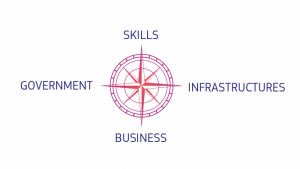Europe’s Digital Compass
The Commission proposes a Digital Compass to translate the EUʼs digital ambitions for 2030 into concrete terms. They evolve around four cardinal points:
1) Digitally skilled citizens and highly skilled digital professionals; By 2030, at least 80% of all adults should have basic digital skills, and there should be 20 million employed ICT specialists in the EU – while more women should take up such jobs;
2) Secure, performant and sustainable digital infrastructures; By 2030, all EU households should have gigabit connectivity and all populated areas should be covered by 5G; the production of cutting-edge and sustainable semiconductors in Europe should be 20% of world production; 10,000 climate neutral highly secure edge nodes should be deployed in the EU; and Europe should have its first quantum computer;
3) Digital transformation of businesses; By 2030, three out of four companies should use cloud computing services, big data and Artificial Intelligence; more than 90% SMEs should reach at least basic level of digital intensity; and the number of EU unicorns should double;
4) Digitalisation of public services; By 2030, all key public services should be available online; all citizens will have access to their e-medical records; and 80% citizens should use an eID solution.
The Compass sets out a robust joint governance structure with Member States based on a monitoring system with annual reporting in the form of traffic lights. The targets will be enshrined in a Policy Programme to be agreed with the European Parliament and the Council.









